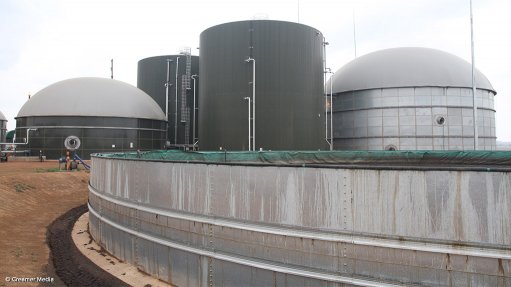
Photo by: Duane Daws
South Africa’s first commercially viable biogas-to-electricity plant has successfully started providing renewable energy to automotive manufacturer BMW South Africa’s (SA’s) Rosslyn plant, north of Pretoria.
A year after cementing an offtake deal with the carmaker, energy company Bio2Watt’s Bronkhorstspruit plant generated first power on October 10, marking BMW’s first step in bringing its Rosslyn plant to 100% self-sufficiency by 2020.
The ten-year offtake partnership aimed to provide up to 30% of the 12 MW of energy required by the Rosslyn plant through the delivery of renewable energy from the R150-million 4.4 MW plant.
“The biogas process relies on organic waste, which is directed into a digester where biogas is produced and then goes into a gas engine to produce electricity. This is inserted into the power grid for uptake by power purchasers like BMW,” said Bio2Watt CEO Sean Thomas on Friday.
The plant fed around 160 t/d of manure, emerging from the thousands of cattle and sheep resident on the farm located on major feedlot Beefcor, east of Pretoria, into two anaerobic digesters that produce the biogas feedstock for a combined heat and power application.
Unveiling the plant to media on Friday, Thomas said that, in total, the plant used around 500 t/d of a combination of manure, abattoir waste, food sludge, fruit and vegetable waste and paper recycling sludge.
The plant was also within proximity to key fuel supplies, grid access and sufficient water from Beefcor’s stormwater collection dams.
BMW SA MD Tim Abbott told the media that the project contributed to BMW ’s sustainability strategy of gradually increasing the use of renewable sources for electricity consumption by its production plants globally from the current 51% to 100% over the next few years.
Over the past year, the group had reduced its energy consumption per vehicle by 5% to 2.25 MW and the waste per vehicle produced from 5.73 kg to 4.93 kg.
Meanwhile, Thomas said the modular plant was scalable to 12 MW, but no plans were in place to expand its output at this stage.
However, Bio2Watt was set to start construction on a second waste-to-energy plant on a dairy farm in Malmesbury, Western Cape, in 2016, with additional farms being sought for partnerships.